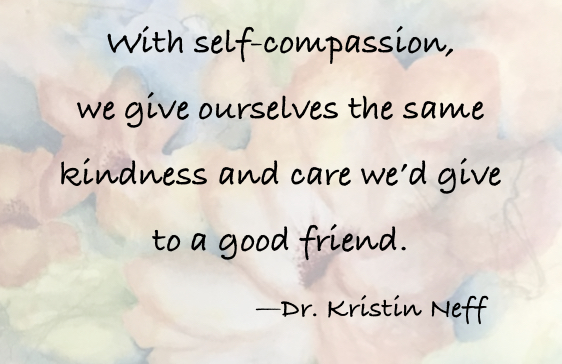To skip my reflection on my own mindful self-compassion journey, and get right to the 61 free resources to support your mindful self-compassion practice , click here.
Mindful Self-Compassion is not a Self-Improvement Project
Opening her presentation on “Benedictine Spirituality and Self Compassion” in the spring of 2017, my friend and fellow Benedictine Oblate Becky Van Ness, OblSB smilingly admonished us not to treat the learning of self compassion as if it were another project in self improvement.
My response was laughter. Humor enables me to sidle up to my glaring weakness. Ha-ha, yes, that’s me all right.
“I have a compulsion for self-improvement,” I’ll admit.
Those who know me nod vigorously. Yes.
“But I’m working on it.”
This cracks people up. But I’m only half jesting. My conundrum is real. How can I grow if I don’t try?
Since beginning my journey as an Oblate, I have been reading The Rule of Benedict daily, often accompanied by Joan Chittister’s commentary. Not long after I became an Oblate candidate, I read this sentence, but only one word stood out to me then:
“Benedictine spirituality is clearly rooted in living ordinary life with EXTRAORDINARY awareness and commitment.”
Hi. I’m Tracy and I’m a perfectionist.
These days, after years of study and daily contemplative practices, after monthly Oblate group meetings and growing into my community, I see that sentence differently:
“Benedictine spirituality is clearly rooted in living ORDINARY life with extraordinary AWARENESS and COMMITMENT.”
And I’m not even trying to see differently.
Spiritual Practices lead to growth the way soil, nutrients, warmth, light, and water work together to transform a seed into a sapling into a tree.
Five years ago I learned that my husband — my best friend and soul mate — suffers from progressive cognitive impairment caused by non-Alzheimer dementia. I was hurled into a desperate grief that left me so hurting and confused I could barely function. Looking back, wondering how I had moved from that dark, dark place into today, where my life is full of serenity and joy, I discovered 3 attitudes that support self-compassion.
3 simple attitudes to support self-compassion
#1 — Practice Playfully
#2 — Aim for “More Often than Not”
#3 — Make a Specific Commitment to Practice Mindful Self-Compassion

the Gentle Way to practice mindful self-compassion
Allocate 15-30 minutes once a week to educate yourself and begin practicing self-compassion.
Don’t let perfectionism ruin this for you. If you manage to keep your commitment to practice mindful self-compassion “more often than not,” re-mind yourself you’re doing very well.
Don’t work or strive; instead allow your practices of mindful self-compassion to grow you the way soil, nutrients, warmth, light, and water work together, in time, to transform a seed into a sapling into a tree.
Here are 61 Free Resources to support your mindful self-compassion practice
Visit Self-Compassion.Org
Dr. Kristin Neff’s “Home” and “About” pages will quickly introduce you to mindful self-compassion. Start with those, and read her “tips for practice.”
Then do one of her 8 exerices or listen to one of her 10 guided meditations. Her site tells how long each meditation lasts–a helpful feature.
Her “Resources” page has links to 26 websites to help you learn more about this transformative self-care practice.
Vist ChrisGermer.com
Chris Germer, PhD is a clinical psychologist and lecturer on psychiatry (part-time) at Harvard Medical School. He co-developed the Mindful Self-Compassion (MSC) program with Kristin Neff in 2010. This link will take you to a page of 7 audio mindful self-compassion meditations with written instructions for practicing, along with 14 more informal mindful self-compassion meditations.
Try this 30-minute Body Scan Meditation by Jon Kabat-Zinn
May you be mindful,
may you be compassionate,
and may you respond to your own suffering
as you would care for a dear friend.